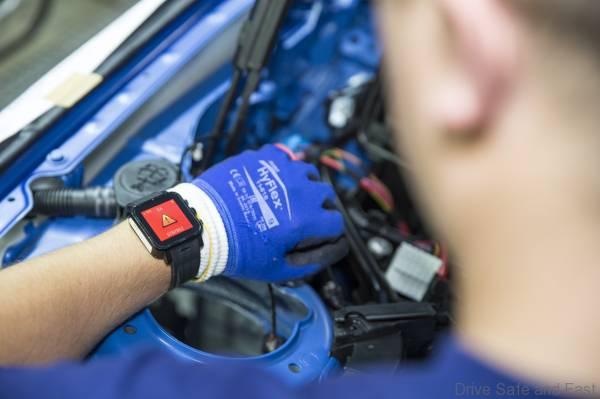he BMW Group continuously optimizes production processes at the BMW Group plants, drawing on the opportunities arising from digitalization. Complex processes in production can be made even more efficient by applying new technologies. For the automotive manufacturer, digitalization opens up new perspectives with regard to the advancement of innovative and people-oriented production systems. In turn, the freed potential in the production systems allows the company to respond even more individually to customers’ wishes and to step up the flexibility of the production chain.
When it comes to digitalization, the BMW Group focuses on six key areas in production:
Context-sensitive assistance systems. Intelligent tools can directly support staff in carrying out their tasks and simplify complex processes as well. In a pilot project, the BMW Group’s Munich and Leipzig plants tested smart watches that alert workers when a car with special requirements is approaching. The display lights up and the vibration alarm is triggered as a reminder to workers that the next process step requires, for instance, a different number of screws to be fitted.
Innovative robot systems. As a way to reduce the strain on workers, physically demanding and non-ergonomic tasks can now be carried out by innovative robot systems. Lightweight robots can work side by side with people without any safety fence; their application ensures the same high level of quality throughout, especially for repetitive and tedious tasks. As early as 2013, the BMW Group started to use lightweight robots for a variety of tasks, such as fixing the sound insulation to the inside of the doors under precise and steady high pressure or applying adhesive to e.g. windscreens. Lightweight robots have been integrated into series production at the plants in Spartanburg, Regensburg, Dingolfing and Leipzig.
Simulation and factory digitalization. The use of digital data in particular offers great potential for raising efficiency in processes. The digital recording of a factory in 3D entails significant advantages compared to the two-dimensional, manual standard approach. One example: It only took one weekend to measure the Rolls-Royce plant in Goodwood, UK, and to record it down to an accuracy of two millimeters with a special 3D scanner and high-resolution digital cameras. So as a first, the site now has a three-dimensional likeness of its production facility for planning purposes; the need for a laborious CAD reconstruction of actual structures and manual recording on-site is eliminated. Contrary to the traditional two-dimensional plans, any spatial change can now be intuitively simulated and assessed. The digitalization provides a precise and comprehensive, up-to-date database for quick and flexible adaptations in production.
Planning and control systems. Automated data analyses lead to major progress in improving quality and efficiency. Especially in the parts provision process of the plants and the component production process, networked data can provide transparency in recording the flow of goods and even give specific information about the quality of parts. At the BMW Group Plants Dingolfing and Landshut, for instance, data matrix codes identify and record the entire production process of carbon parts for the new BMW 7 Series. In addition, the square, camera-readable bar code also comprises information about the processing chain.
Smart logistics. On a larger scale, smart data technologies provide real-time information on the entire supply chain. In case of problems on the transit route, the respective parts supply unit respond immediately. These ‘radar’ functionalities increase the transparency in the BMW Group’s international supply network and optimize supply chains.
Advanced analytics. Automated data analyses improve process safety at the BMW Group’s plants. It is most of all the sum of many small measures that helps plants to optimize processes. For instance, when standard process curves are analyzed, the data of an individual screw bonding process can be automatically structured and assessed. Deviations from the standards are immediately remedied before process disturbances occur. Thanks to the great number of application scenarios at the BMW Group production sites, efficiency and quality can be increased substantially.








